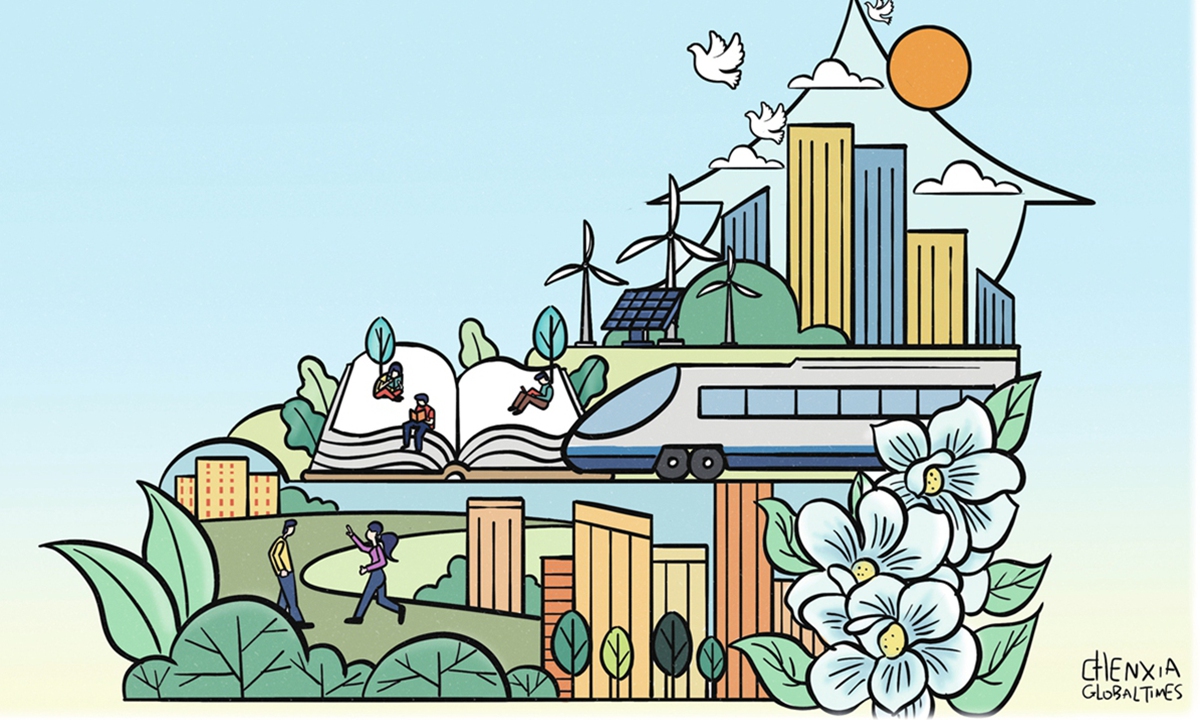
Illustration: Chen Xia/GT
On a recent trip to Yunnan, I was introduced to Ximeng by local friends, and everyone who mentioned it to me would say, "It's the only county in China that doesn't have traffic lights." There are 2,847 counties in China.
Ximeng is a county in China's Yunnan Province, located in the extreme southwest of China, bordering Myanmar. Ximeng is an autonomous county, home to the Wa ethnic group, which is an ethnic minority in China and Myanmar, with about 430,000 people in China. Many people believe that the lack of traffic lights is because the county is still very backward, but as cars drive past the boundary markers of this county, you get the feeling that poverty is actually a thing of the past. In 2019, Ximeng took off its hat as a poor county.
Unlike most counties I've visited, this newly built country has all the urban features of those wealthy counties, such as hospitals, schools, radio and TV stations, etc. The roads are wide and neat, and pedestrians and cars are courteous. You will soon understand why it does not need traffic lights. Ximeng is one of the counties that rose up in the Chinese poverty alleviation program, which has been unprecedented worldwide.
At the beginning of New China (1949), the Wa people were still in the primitive stage of slash-and-burn agriculture and did not even use cattle ploughs. Ximeng people did not walk, but flew into modern society. So the locals still have a saying that in Ximeng, you can see humanity's childhood.
I went to a village perched on top of a hill where in the past, it was said to be almost isolated from the world. With counterpart assistance from Shanghai, families have built new houses, toilets, running water, sewage disposal, and garbage collection systems. The total investment was just over 5 million yuan ($722,600). Of course, you can only really feel what it means of "flying into" modernization when you walk into the lives of these villagers. Talking to a farmer who grows sweet oranges, he told me that with the help of the internet and live streaming, the fruit they grow had been sold all over the country.
A farmer who was still living in extreme poverty over 10 years ago can now share the benefits of the digital economy, which is important for sustainable development.
Although maintaining and stepping forward on the current level of development remains a serious challenge for regions like Ximeng, many villages that are still relatively backward need national investment and support. But once the good times have begun, their way of life, especially their pursuit of the future, will not return to the past. In contrast, in any country in the world, including highly developed and modernized countries like the United States, it is a difficult job to become modern in a short period of time like Ximeng has done.
During my trip to Yunnan, I read an article in The Economist magazine, "The lessons from America's astonishing economic record," which reminded me of another article published in the magazine not long ago, titled "'Poverty, By America' is a fierce polemic on an enduring problem," and I am afraid that only by reading these two articles together can we better understand the difficulty of poverty eradication. It is actually a question of a different development model involving the arrangement of the political system.
In recent times, the Western media often discuss whether China's economy will surpass that of the United States, but the people in Ximeng and all those Chinese people who have come out of poverty are not too concerned about this issue. What they care about is how they can make their family's life happier and, step by step, move away from returning to poverty. This is a challenging issue that Chinese modernization must answer, and it is also a global issue. China's political and institutional arrangements are ready to offer a good solution.
When I left Ximeng, I wondered how the local people would respond if I told them that American leaders always say China is a "destroyer of the world order" and "aggressive."
The author is a senior editor with People's Daily, and currently a senior fellow with the Chongyang Institute for Financial Studies at Renmin University of China. dinggang@globaltimes.com.cn. Follow him on Twitter @dinggangchina


